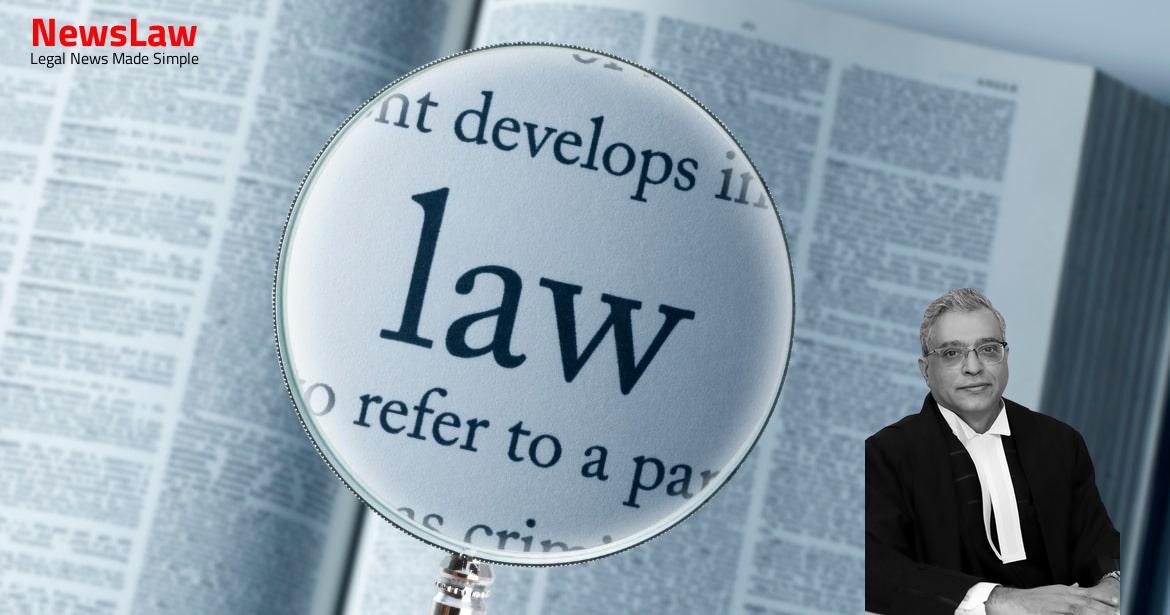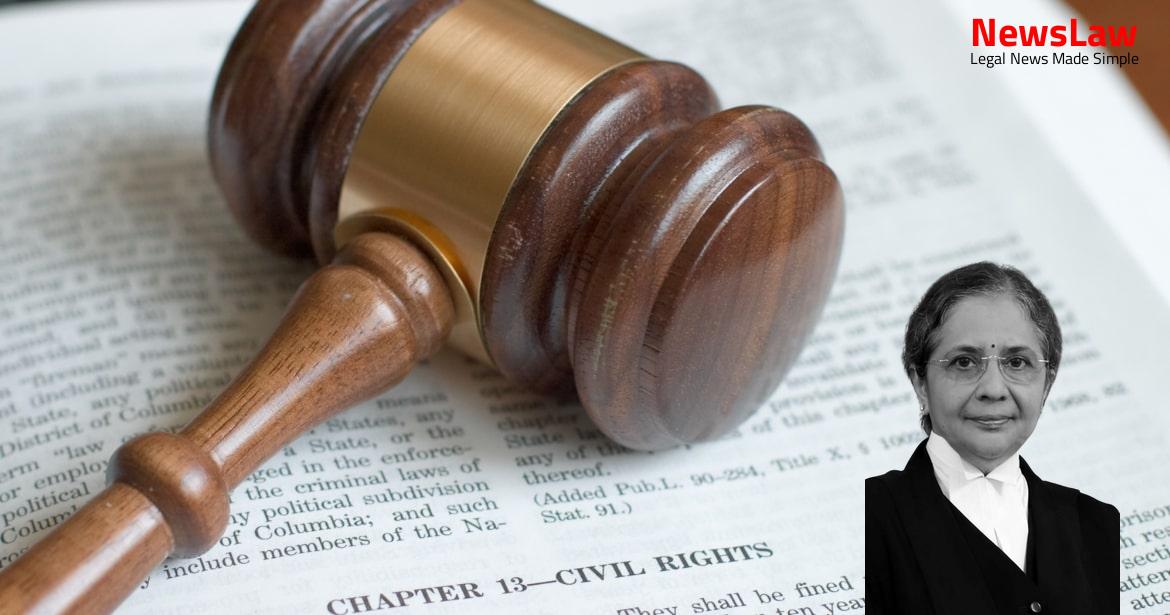Delve into the detailed legal analysis conducted by the court regarding RBI directives in a complex financial dispute. The court’s thorough examination of statutory provisions and regulatory frameworks sheds light on the nuances of the case. Discover how the court’s interpretation impacts financial transactions and regulatory compliance in the realm of banking and finance.
Facts
- The Learned Division Bench set aside the judgment in favor of the defendant and allowed the plaintiff’s appeal.
- The defendant had paid interest accruing in June 1997 to the plaintiff’s predecessor-in-interest even after the RBI communication of 09 June 1997.
- The defendant admitted in a letter to RBI dated 23 December 1997 that it was impossible to withhold payment forever.
- The court ruled that the defendant could not be held liable for the delayed payment.
- The plaintiff’s acceptance of payment under the Bonds in February 2005 without protest was noted by the Trial Judge.
- Based on observations, the Division Bench held that the RBI communication was a suggestion and not an order.
- The suit was not barred by accord or satisfaction as the plaintiff did not acknowledge all claims as satisfied upon receiving payment warrants in February 2005.
- The plaintiff was deemed to be at liberty to raise further demands, including interest on delayed payment.
- The defendant was directed to pay specified simple interest rates on interest and principal amounts by 29.02.2020.
- The challenge in the appeals was against the decision to dismiss the suit of M/s. SIBCO Investment Pvt Ltd and it was reversed by the Division Bench.
- The Trial Judge did not agree that there was a deliberate attempt by the defendant to delay the payment of the maturity amount.
- CRB Capital sold Bonds to Shankar Lal Saraf in February 1997, who then sold them to SIBCO in July 1998.
- Defendant made payment to SIBCO in 2005 as per the Bond agreement.
- Bonds deposited with SIDBI in July 1998 for name endorsement to SIBCO, but SIDBI refused due to CRB Capital’s liquidation.
- Plaintiff initially filed for mandamus in Calcutta HC, later directed to Company Court in Delhi.
- Interest payable half-yearly, not paid due to ongoing legal proceedings.
- Company Court, in 2004, confirmed the transactions as genuine, but some claims over the Bonds existed.
- Defendant claims non-fulfillment due to RBI directions and pending legal actions, denying any negligence.
- SIBCO later filed a suit for delayed payments against SIDBI, citing interest beyond maturity period.
- Defendant sought advice from Official Liquidator as per RBI directions regarding Bonds.
- Plaintiff objected to TDS deduction rate, later resolved by defendant.
- Court proceedings and notifications regarding restrictions on dealings with Bonds.
- Multiple disputes and clarifications sought between parties and regulatory bodies regarding the Bonds.
Also Read: Insurance Claim Repudiation due to Fire Incident: Court’s Legal Analysis
Issue
- The suit was filed against Small Industries Development Bank of India (SIDBI) seeking interest on the alleged belated payment of principal sum and accrued interest to the plaintiff for the Bonds issued by SIDBI.
- The key question to be answered is whether the plaintiff has set forth a just claim based on the Bonds issued by the defendant.
- The analogy to the trial in Shakespeare’s The Merchant of Venice is brought up, likening the plaintiff to Shylock claiming the promised pound of flesh in the form of interest on delayed payment on the Bonds purchased.
Arguments
- Mr. K V Viswanathan, representing the defendant, argued against the legality of the judgment of the appellate Bench of the Calcutta High Court.
- The defendant’s arguments include SIDBI acting in accordance with RBI directives, withholding payment under the Bonds due to potential fraudulent preference, SIBCO’s purchase of the bonds in a suspect manner, the proactive actions of the petitioner in communicating with RBI/Official Liquidator, past litigation where interest claims were not made, acceptance of payments without protest, and the claim that SIBCO’s interest pendente lite is an after-thought and unjustified.
- These arguments aim to invalidate the judgment and justify the defendant’s actions regarding the withheld amounts and interest payments.
- The plaintiff argues that the Company Court judgment has attained finality and the defendant is barred by res judicata from raising the issue of fraudulent preference.
- The issue of fraudulent preference is no longer res integra as no one challenged the Company Court’s judgment.
- The contention that the defendant acted mala fide in withholding payment is not accepted as the defendant’s actions were in good faith.
- The plaintiff failed to show how the defendant derived any undue benefit by withholding the payment accrued on the Bonds.
Analysis
- The RBI’s directive dated 09.06.1997 was justified based on statutory provisions.
- The RBI’s authority to issue directions is backed by the RBI Act and Banking Regulation Act.
- The defendant’s impression regarding the transfer to Shankar Lal Saraf was reasonable.
- The plaintiff accepted payment without protest, indicating acquiescence.
- The demand for interest on delayed payment was raised after a significant delay.
- The plaintiff failed to challenge previous judgments, indicating acquiescence.
- The plaintiff’s claim for interest after delay was dismissed on multiple grounds.
- The RBI’s communication to withhold payments was binding on the defendant.
- The defendant acted prudently in withholding payment as directed by the RBI.
- The legality of the RBI notification was not challenged and therefore must be upheld.
- The plaintiff’s failure to seek relief against the RBI impacts their claim.
- The issue of interest payment was not raised in a timely manner, indicating waiver.
- The defendant acted in accordance with legal obligations and prudence.
- There were reasonable legal concerns regarding the transactions involving the Bonds.
- The defendant was justified in withholding payment until the Company Court’s decision.
- The court emphasized the binding and enforceable nature of directions issued by the RBI, similar to provisions of the RBI Act.
- Justice S. B. Sinha highlighted the binding nature of directions under S. 35-A of the Banking Regulation Act, 1949 on banking companies.
- The court emphasized that the intention of the legislature determines whether a circular letter issued by a statutory authority is binding or not.
- The power under Section 35-A to issue directions must be exercised in public interest, interest of banking policy, interest of depositors, or interest of the banking company.
- Feedback from the Court decisions on issues like fraudulent preference and interest pendente lite were considered in the interpretation of the case.
- The authority of RBI to issue directives was reinforced through references to various court judgments and statutory provisions.
- The court clarified the conditions for a transaction to constitute fraudulent preference and the significance of acceptance by conduct.
- The importance of objective satisfaction under Section 45-L of the RBI Act in justifying actions and directions by the RBI was discussed.
- The judgment highlighted the wide-ranging powers of the RBI in financial and monetary matters, emphasizing its statutory authority.
- The Reserve Bank of India (RBI) has the authority to issue directions to Non-Banking Financial Companies (NBFCs) in the public interest or to protect depositors.
- The RBI Act, 1934 empowers the RBI to prohibit NBFCs from accepting deposits or alienating assets if they violate any statutory provisions or fail to comply with RBI directives.
- Section 35-A of the Banking Regulation Act, 1949 allows the RBI to give directions to banking companies in the interest of the public, banking policy, depositor interests, or proper management of banks.
- In cases of winding-up proceedings, transfers made within a specific timeframe before the winding-up petition can be deemed as fraudulent, as outlined in Section 531 of the Companies Act, 1956.
- The timing of winding-up proceedings and the deemed fraudulent preference rule are crucial factors in determining the validity of property transfers during such periods.
- The RBI has the authority to collect information, issue directions, and regulate NBFCs to maintain financial stability and protect the interests of depositors and the financial system.
- The RBI’s decisions and directives hold significant importance, surpassing even executive decisions, under the regulatory framework.
- SIBCO has already received their just entitlement
- Additional sum in our estimation is not merited
- Burdening the defendant with any further amount towards interest would be akin to Shylockian extraction of blood
Decision
- The defendant’s appeal against the impugned judgment is allowed by restoring the judgment of the Trial Court.
- The plaintiff’s cross-appeal is rejected.
Case Title: SMALL INDUSTRIES DEVELOPMENT BANK OF INDIA Vs. M/S SIBCO INVESTMENT PVT. LTD. (2022 INSC 3)
Case Number: C.A. No.-000008-000008 / 2022



